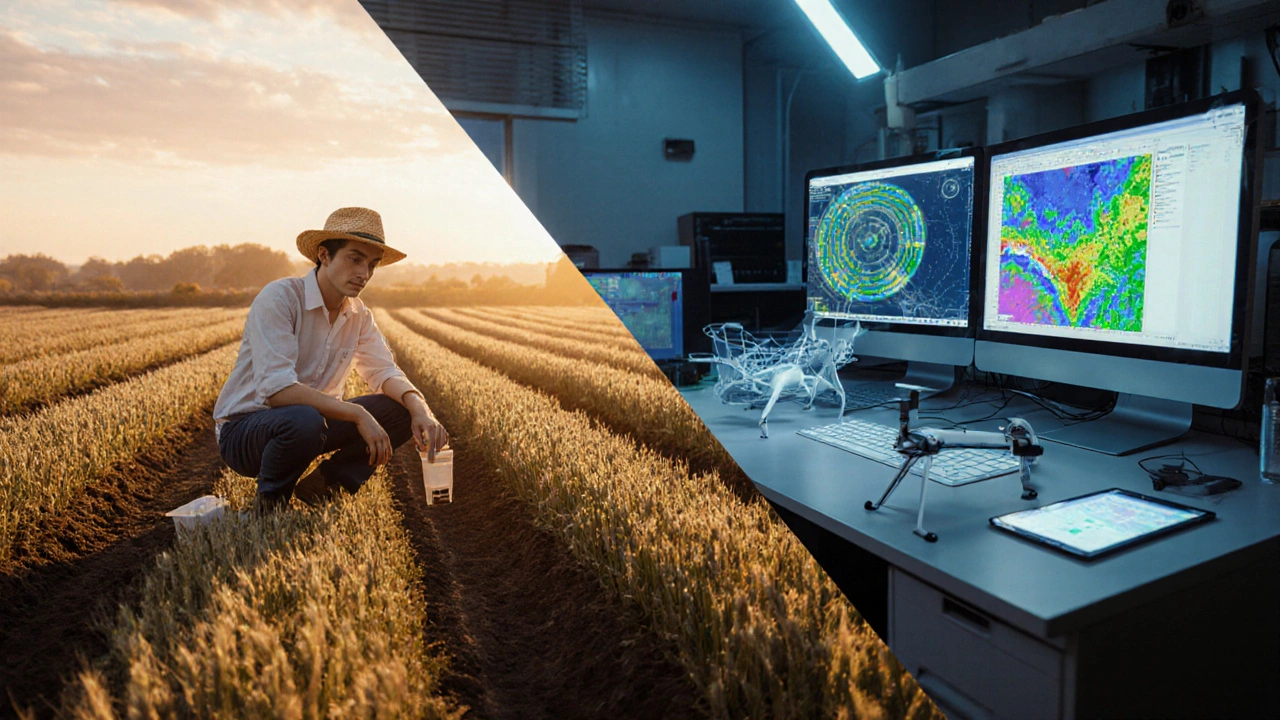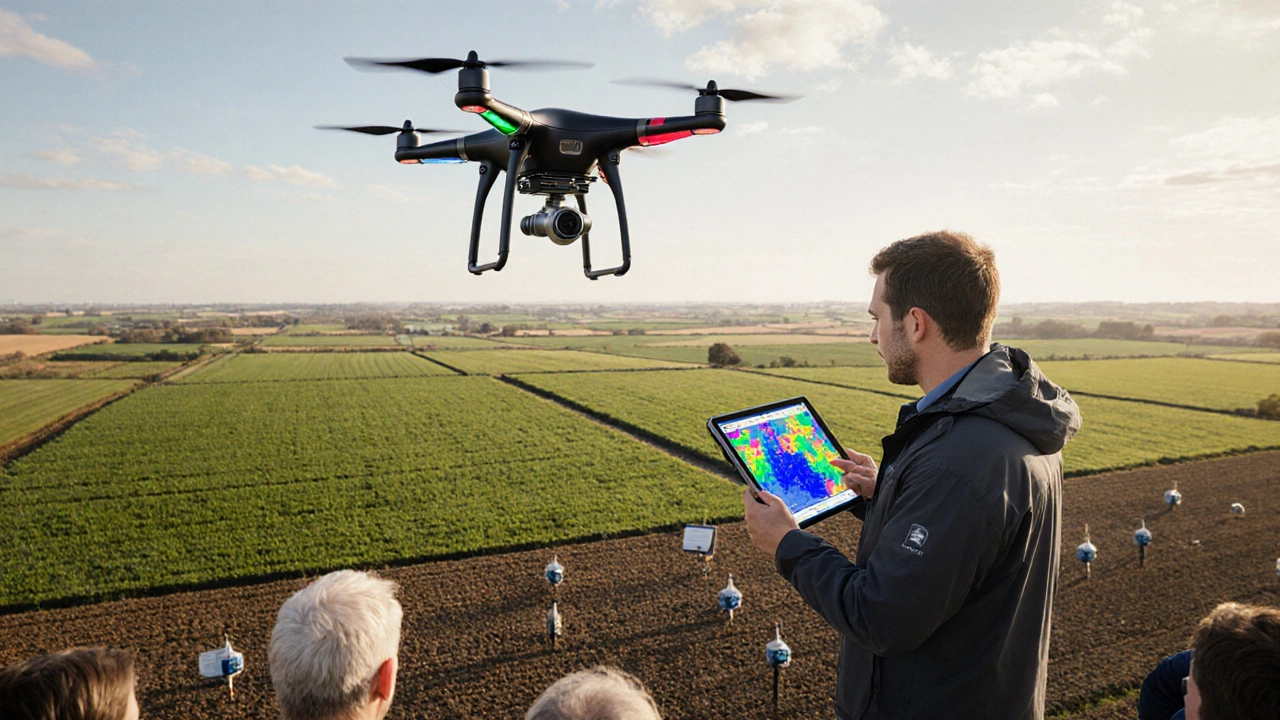Agricultural Science Careers: Jobs, Paths & Outlook
 Oct, 9 2025
Oct, 9 2025
Agricultural Science Career Path Finder
Recommended Career Paths
Wondering what you can do with a love for plants, soil, and food systems? agricultural science careers span everything from hands‑on field work to high‑tech data analysis, and they’re growing fast as the world pushes for more sustainable food production.
Quick Takeaways
- Typical entry point: bachelor’s degree in agricultural science, biology, or a related field.
- Top‑earning roles (UK) average £45,000-£70,000 per year.
- Job growth: 12% increase expected by 2035, driven by climate‑smart farming.
- Key skills: data analysis, problem solving, communication, and field expertise.
- Professional bodies such as the Institute of Agricultural Management offer certifications that boost employability.
Below you’ll find a step‑by‑step walk‑through of the most common career routes, the education you’ll need, salary expectations, and how to break into the sector.
What is Agricultural Science?
Agricultural Science is a multidisciplinary field that studies crop production, livestock management, soil health, and the economics of farming. It combines biology, chemistry, engineering, and data science to improve food quality, increase yields, and reduce environmental impact.
Education Pathways
Most roles start with a bachelor’s degree in Agricultural Science, Agronomy, Animal Science, or a related discipline. Universities in the UK such as the University of Reading, University of Edinburgh, and Newcastle‑Upon‑Tyne offer accredited programmes that include field labs, GIS mapping, and industry placements.
For specialised roles, a master’s or PhD may be required-especially for research‑intensive positions like plant breeding or soil chemistry. Short‑course certificates from bodies like the Royal Agricultural University can also fast‑track you into niche jobs such as precision farming.

Top Career Options
Agronomist
Agronomists advise farmers on best practices for crop selection, fertiliser use, and pest management. They often work for agribusiness firms, government agencies, or as independent consultants.
Typical duties include soil testing, yield modelling, and training growers on sustainable techniques. In the UK, the median salary is around £38,000, with senior consultants earning upwards of £55,000.
Soil Scientist
Soil scientists analyse physical and chemical properties of soil to improve fertility and carbon sequestration. Their work supports both agricultural and environmental projects.
Employers range from research institutes to private labs. Salaries start at £30,000 and can reach £60,000 for those leading large‑scale monitoring programmes.
Plant Breeder
Plant breeders develop new varieties with higher yields, disease resistance, or climate resilience. This role blends genetics, field trials, and biotech tools like CRISPR.
Large agribusinesses such as Glencore Agriculture and BASF hire breeders in the UK; average salaries sit near £45,000, with senior leads topping £70,000.
Crop Consultant
Crop consultants provide on‑the‑ground advice during planting, growth, and harvest seasons. They use satellite imagery, drones, and soil moisture sensors to optimise inputs.
Freelance consultants can earn £300-£500 per day, while full‑time positions at ag‑tech firms pay £40,000-£55,000.
Agricultural Engineer
Agricultural engineers design machinery, irrigation systems, and processing equipment. Their work improves efficiency and reduces waste.
Key employers include John Deere UK, Massey Ferguson, and government research bodies. Median salary is £42,000, with project managers earning over £65,000.
Food Scientist
Food scientists work on product development, safety testing, and nutritional analysis. They bridge farm production and consumer markets.
Positions in food manufacturers like Nestlé or private labs start at £35,000 and can climb to £60,000 with experience in product innovation.
Extension Officer
Extension officers act as the link between research institutions and farmers, translating scientific findings into practical guidelines.
In the UK, these roles are often funded by DEFRA or local councils, offering salaries of £32,000-£48,000.
Agricultural Economist
Agricultural economists analyse market trends, policy impacts, and supply‑chain efficiencies. They work for think‑tanks, government, and commodity groups.
Typical earnings range from £40,000 for junior analysts to £80,000+ for senior strategists.
Salary & Job Outlook
According to the UK Office for National Statistics, employment in the agricultural sector grew 8% between 2020‑2023, and the broader “agri‑tech” segment is projected to expand by 12% annually through 2035. Factors driving demand include climate‑smart farming, digital agriculture, and rising global food needs.
Median salaries vary by role, but most positions sit between £30,000 and £55,000 for early‑career professionals. High‑skill specialties-plant breeding, precision engineering, and senior consultancy-often exceed £70,000.
Key Skills & Certifications
- Data analysis: Proficiency with R, Python, or GIS tools to interpret field data.
- Problem‑solving: Ability to diagnose crop issues and devise cost‑effective solutions.
- Communication: Translating technical recommendations for farmers and stakeholders.
- Regulatory knowledge: Understanding of UK farming regulations, organic standards, and EU trade rules.
- Professional certifications: CIfA (Chartered Institute of Agricultural Engineers), RSM (Royal Society of Medicine) food safety modules, or accredited precision‑agri courses.

How to Get Started
- Earn a relevant bachelor’s degree; aim for programmes with strong placement links.
- Secure an internship or summer placement on a farm, research station, or ag‑tech company.
- Build a portfolio of projects-soil‑test reports, GIS maps, or prototype equipment designs.
- Earn certifications that match your target role (e.g., CIfA for engineering, CIPR for consultancy).
- Join professional networks such as the Institute of Agricultural Management or the British Society of Animal Science.
- Stay current with industry trends via journals like "Agronomy Journal" and conferences such as the UK Agri‑Tech Expo.
Remember, many employers value practical experience just as much as academic grades, so hands‑on work matters.
Emerging Trends Shaping Careers
Digital agriculture is reshaping job descriptions. Drones, remote sensing, and AI‑driven decision platforms mean data‑savvy agronomists are in high demand. Similarly, carbon‑credit schemes are creating new roles focused on measuring and verifying soil carbon sequestration.
Climate‑resilient breeding programs are also expanding, especially as UK farms adapt to wetter weather patterns. Professionals who can combine genetics with predictive modelling will find abundant opportunities.
| Career | Typical Education | Median Salary | Growth (2025‑2035) |
|---|---|---|---|
| Agronomist | BSc Agricultural Science | £38,000 | 10% |
| Soil Scientist | MSc Soil Science | £45,000 | 12% |
| Plant Breeder | PhD Plant Genetics | £55,000 | 14% |
| Crop Consultant | BSc + Agri‑Tech Certificate | £42,000 | 13% |
| Agricultural Engineer | MEng Agricultural Engineering | £48,000 | 11% |
| Food Scientist | BSc Food Science | £50,000 | 9% |
| Extension Officer | BSc + Extension Training | £40,000 | 8% |
| Agricultural Economist | MSc Agricultural Economics | £55,000 | 10% |
Frequently Asked Questions
Do I need a PhD to work in agricultural science?
Not for most practical roles. A bachelor’s degree gets you into agronomy, soil science, or farm consultancy. PhDs are reserved for advanced research, plant breeding, or university teaching positions.
What is the fastest‑growing job sector in agriculture?
Precision agriculture and ag‑tech services are expanding at double‑digit rates, driven by AI, drone mapping, and carbon‑credit initiatives.
Can I transition from a conventional farming background into ag‑tech?
Absolutely. Upskilling with data‑analysis courses, GIS certification, and hands‑on experience with sensor equipment makes the shift smoother.
What professional bodies should I join?
Consider the Institute of Agricultural Management (IAM), the Royal Institution of Chartered Surveyors (RICS) for land‑management, and the British Society of Animal Science for livestock‑related tracks.
Are there scholarships for agricultural science students in the UK?
Yes. The DEFRA Undergraduate Scholarships, the Royal Agricultural University Bursaries, and industry‑funded schemes from companies like Syngenta provide financial support for high‑performing students.